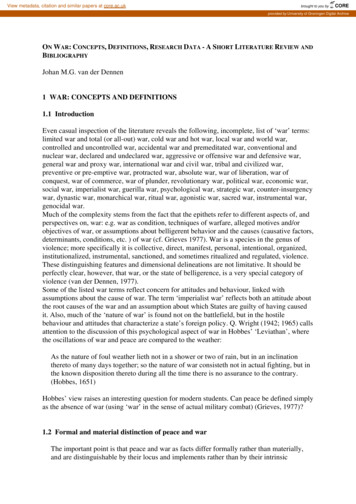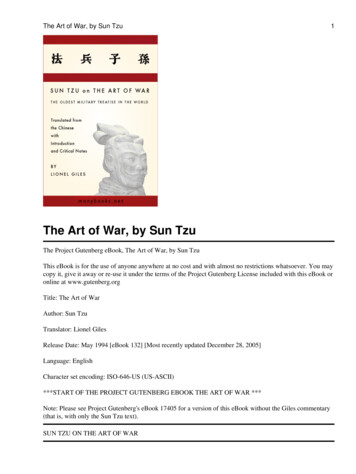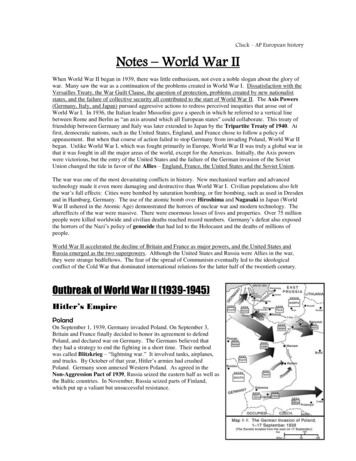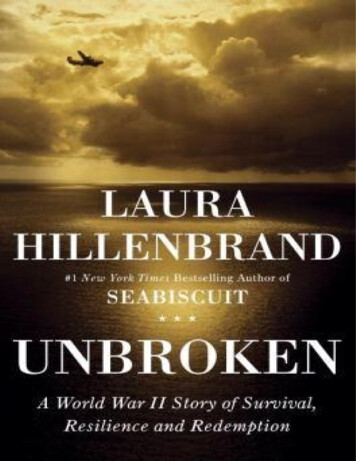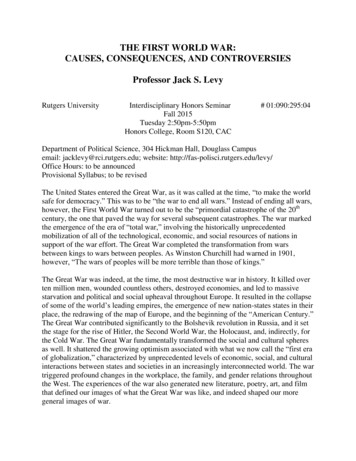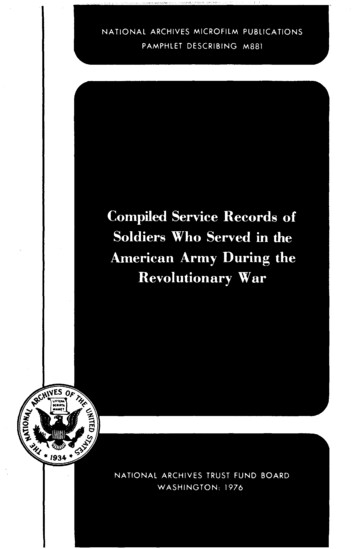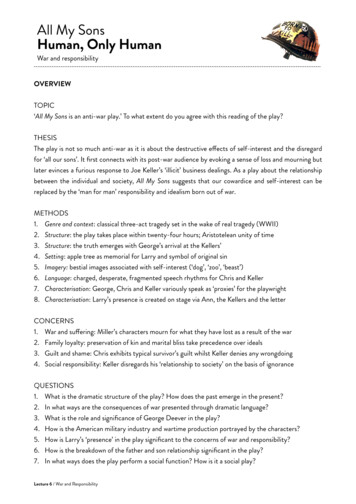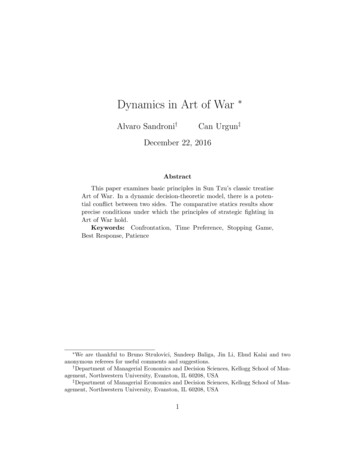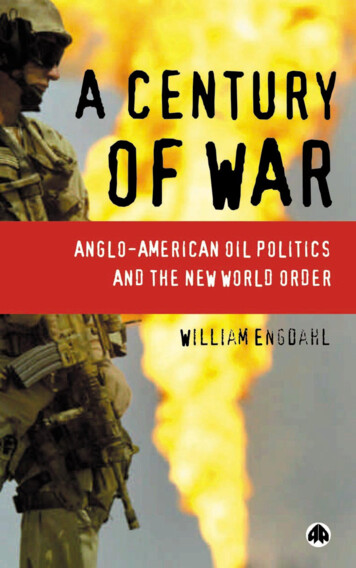
Transcription
A Century of WarAnglo-American Oil Politicsand the New World OrderRevised EditionWilliam EngdahlPlutoPPressLONDON ANN ARBOR, MIEngdahl 00 pre iii24/8/04 8:18:06 am
First published in English 1992Revised edition first published 2004 by Pluto Press345 Archway Road, London N6 5AAand 839 Greene Street, Ann Arbor, MI 48106www.plutobooks.comCopyright William Engdahl 1992, 2004The right of William Engdahl to be identified as the author of this workhas been asserted by him in accordance with the Copyright, Designsand Patents Act 1988.British Library Cataloguing in Publication DataA catalogue record for this book is available from the British LibraryISBNISBN0 7453 2310 3 hardback0 7453 2309 X paperbackLibrary of Congress Cataloging in Publication Data applied for10987654321Designed and produced for Pluto Press byChase Publishing Services, Fortescue, Sidmouth, EX10 9QG, EnglandTypeset from disk by Stanford DTP Services, Northampton, EnglandPrinted and bound in Canada by Transcontinental PrintingEngdahl 00 pre iv24/8/04 8:18:06 am
ContentsPreface1. The Three Pillars of the British EmpireThe Empire needs a new strategyFree trade and the sinews of British powerBritain’s informal empireThe Great Depression of 1873Engdahl 00 pre vix112582. The Lines are Drawn: Germany and the Geopoliticsof the Great WarGermany’s WirtschaftswunderA Berlin bank panicThe necessity for ship and rail infrastructure111114153. A Global Fight for Control of Petroleum BeginsA British admiral sees beyond lamp oilD’Arcy captures the secret of the burning rocksBy rail from Berlin to BaghdadThe new DreadnoughtsSir Edward Grey’s fateful Paris tripFashoda, Witte, great projects and great mistakes191920222829304. Oil Becomes the Weapon, the Near East theBattlegroundA bankrupt Britain goes to warOil in the Great WarBritain’s secret eastern war‘Selling the same horse twice’Arthur Balfour’s strange letter to Lord RothschildBalfour backs the new concept of empire353537404344465. Combined and Conflicting Goals: The United StatesRivals BritainMorgan finances the British warNew York bankers challenge the City of LondonBritain moves for oil supremacyChurchill and the Arab BureauA battle for control of MexicoThe secret of British oil control5050555859606124/8/04 8:18:06 am
viA Century of War6. The Anglo-Americans Close RanksA conference in GenoaSinclair and the American bidGermany tries to outflank the BritishMilitary occupation of the RuhrThe real origins of Weimar hyperinflationThe Anglo-American Red LineDeterding, Montagu Norman and Schacht’s Hitler Project65656668707174767. Oil and the New World Order of Bretton WoodsA new empire rises from the ashes of warThe dollar standard, Big Oil and the New York banksThe Marshall Plan forms a postwar oil hegemonyThe power of the New York banks tied to U.S. oilMohammed Mossadegh takes on Anglo-American oilItaly attempts independence in oil and developmentMattei’s bold development initiative85858788909197998. A Sterling Crisis and the Adenauer–de Gaulle ThreatContinental Europe emerges from the rubble of warAnglo-American grand designs against Europe1957: America at the turning point‘That ’58 Chevy’The dollar wars of the 1960sThe Vietnam option is takenThe beginnings of America’s internal rotSterling, the weak link, breaksDe Gaulle is toppled1051051071091101111141171201259. Running the World Economy in Reverse: Who Madethe 1970s Oil Shocks?Nixon pulls the plugAn unusual meeting at SaltsjöbadenDr. Kissinger’s Yom Kippur oil shockThe economic impact of the oil shockTaking the ‘bloom off the nuclear rose’Developing the Anglo-American green agendaPopulation control becomes a U.S. national security issue12712713013513814114314710. Europe, Japan and a Response to the Oil ShockThe petrodollar monetary order devastates thedeveloping worldFrom Colombo comes a political earthquakeEngdahl 00 pre vi15015015624/8/04 8:18:06 am
ContentsAtoms for Peace becomes a casus belliGold, dollar crisis and dangerous new potentials fromEuropeThe Crash of 1979: Iran and Volckervii16216516911. Imposing the New World OrderVolcker borrows a British modelGunboat diplomacy and a Mexican initiativeWall Street replays the 1920s, IMF-styleReagan’s chickens come home to roost‘We’ll get by with a little help from our friends’The fall of a wall panics some circlesSaddam and Operation Desert StormThe target: an independent Europe and Japan17817818319119920720921321912. From the Evil Empire to the Axis of EvilFinding the new bogeymanJapan: wounding the lead goosePhase two: shooting Asian tigersWashington revisits Halford MackinderRussia gets the IMF Third World cureYugoslavia gets the shock therapyU.S. oil geopolitics in the Balkans22322322522923123323824113. A New Millennium for Oil GeopoliticsBush brings Big Oil back to Washington‘Where the prize ultimately lies’‘The New American Century’From Kabul to Baghdad: war on terror or war on oil?‘You’ve got to go where the oil is’The peak of oil?Oil and bases: removing the obstacles‘Full spectrum ix I:271Founding Members of the TrilateralCommission (1973)Appendix II: Participants at the Saltsjöbaden Meeting ofthe Bilderberg Group (1973)IndexEngdahl 00 pre vii28528628824/8/04 8:18:06 am
viiiA Century of WarLIST OF FIGURES1. Agreement between the British and Sheikh al-Sabah ofKuwait (1899)2. Attitudes of the British press towards Germany’s BaghdadRailway project (1899)3. British map of the Mesopotamian oilfields (1914)4. List of proposed U.S. Bilderberg group participants (1973)5. Excerpts from confidential Bilderberg protocol(Saltsjöbaden, 1973)6. Cover page of Bilderberg protocol (Saltsjöbaden, 1973)7. Partial list of official Bilderberg attendees(Saltsjöbaden, 1973)Engdahl 00 pre viii26274113113213313424/8/04 8:18:06 am
PrefaceThe fall of the Berlin Wall at the end of the 1980s and the collapseof the Soviet Union were hailed by many as the dawn of a new eraof peace and prosperity. Some authors, such as Francis Fukuyama,proclaimed it as the beginning of the end of history. The entireworld seemed to open to economic cooperation, to investment, todemocratic ideas. Trade barriers fell, doors opened. Little more thana decade later, the optimism was long forgotten as the outlines of avery different world were emerging.As this preface to the new edition of A Century of War was written,the world was mired in a bloody series of wars, the most seriousbeing the war in Iraq. It soon became clear to the world that thedecision of President George W. Bush to go to war against Iraq hadlittle to do with the threat of weapons of mass destruction. It was alsoincreasingly clear that the U.S. agenda in Iraq had little to do withthe proclaimed effort to ‘bring democracy’ to a once despotic Iraq.That naturally raised in many minds the question of why the UnitedStates put so much of its credibility, of its reputation, of what somecall its soft power, at risk, for apparently so little. The answer to thequestion was a short one: it was about oil. But not about oil in thesimple sense many believed. This war was not an issue of corporategreed. It was about power, and geopolitical power above all.War in Iraq was about the very basis of America’s ‘national security,’of future American power. America’s role as the sole hegemon was theunspoken reason for the war, and for this reason neither of the majorpresidential candidates offered an alternative to American militaryoccupation of the vast oilfields of Mesopotamia. Iraq, as hawkishPentagon strategists put it, was part of the American post-cold waragenda, U.S. pursuit of ‘full spectrum dominance.’ The role of oil inthe war, and the role of oil in most of the wars of the past centuryor more forms the heart of this study of power and geography. It isthe thread running through the chapters of this book.In 1904, a British geographer, Halford Mackinder, presented aseries of theses to the Royal Geographic Society in London underthe title ‘The Geographical Pivot of History.’ Almost a century later,American security adviser and strategist Zbigniew Brzezinski spokein admiration of the work of Mackinder and his theory of EurasianixEngdahl 00 pre ix24/8/04 8:18:07 am
xA Century of Wargeopolitics. It quietly but clearly guided American global strategy. Theoccupation of the oilfields of Iraq, the war in Kosovo and the Balkans,endless civil wars in Africa, financial crises across Asia, the dramaticcollapse of the Soviet Union and the subsequent emergence of aRussian oligarchy, blessed by the International Monetary Fund andby Washington, all assumed coherence in a world where geopolitics,power and control dictated relations.This book is no ordinary history of oil. The bare facts can be foundelsewhere. The causal force driving the events is rarely spoken of. Herewe present a sometimes controversial description of power and war,finance and economic warfare, and the relation of oil and financeto that power. One year after the U.S. occupation of Baghdad, thegoals and aims of the world’s only superpower were being questionedas they had not been since the Vietnam War. Degrading scenes ofIraqis being tortured filled the pages of world media. Allegationsof corruption and collusion reaching up to the highest levels ofWashington officialdom were commonplace. Outrage across theIslamic world was growing against a Washington foreign policythat had little in common with the policies of the U.S. FoundingFathers. Yet too much of the debate failed to take into account thefundamentals of American national security or its power. In 1945, thesun finally set on the British Empire. A year later in Fulton, Missouri,Winston Churchill helped light the spark of what came to be fourdecades of cold war. It was the emergence of the system which HenryLuce termed the American Century.The American Century, stripped of the rhetoric of freedom, peaceand democracy, was based on clear US hegemony among nations. Itrested on two pillars. The one pillar was the uncontested role of USmilitary power, a dominance which no combination of powers hadbeen able to challenge since the end of the Second World War in1945. The Soviet Union ultimately collapsed amid ruin in the effortto challenge that hegemony. In 1979 China decided to cooperatewith that hegemony and realized, perhaps too late, that it had beena double-edged sword. The second pillar of American power was theuncontested role of the dollar as world reserve currency. The UnitedStates created the Bretton Woods System in 1944, in order to establishthis unique role. The dollar served as reserve currency long after ithad not one ounce of gold to back it.The combined power of its military dominance and monetarydominance allowed the United States the enviable luxury of printingendless paper certificates, its dollars, and giving them to the rest of theEngdahl 00 pre x24/8/04 8:18:07 am
Prefacexiworld in exchange for well-engineered cars, machinery, textiles andevery imaginable product. It was the greatest confidence game theworld had ever seen. Americans bought the imports with more dollardebt, creating an edifice of dollar debt on which the entire world wasdependent. This special hegemony also allowed the United States tobecome the world’s largest debtor, to run endless trade imbalances,to inflate its currency beyond imagination, to create a buildup ofprivate and public debt unprecedented in world history. So long asother nations depended on American markets for their trade, and onAmerican military protection for their national security, the gameappeared endless. Japan’s role as ‘lender of last resort’ to the U.S.was supplemented at the turn of the century by China. Hundreds ofbillions of dollars in Japanese, Chinese and other foreign purchasesof U.S. Treasury debt, U.S. real estate debt, and other assets, proppedup the American economy long after it made any economic sense.The power of the dollar and the power of the U.S. military hadbeen uniquely intertwined with one commodity, the basis of theworld economic growth engine, since before the First World War.That commodity was petroleum, and in its service British, American,German, French, Italian, and other nations called their soldiers towar. As Henry Kissinger once expressed this importance: ‘controlenergy and you control the nations.’ Oil played a decisive role in thecollapse of the Soviet Union. Oil defined American foreign policy inmuch of the world during the cold war. And oil defines Americanmilitary actions since the end of the cold war as never before. Thehow and why of that process define our theme here.In 1919 Mackinder termed the winning of a British Mandate overPalestine the most important geopolitical outcome of the First WorldWar. In the first decade of the third millennium, Palestine and Israeland Middle East geopolitics were still at the heart of world powerpolitics, even if the players in the power complex had changed.How the destiny of the American Century was tied to the destinyof this small part of the world was a question of heated debate anddiscussion. A group of ultra-conservative ideologues largely aroundthe Republican Party of George Bush were been accused of turningAmerican foreign policy into a unilateral pursuit of military empire.Some defenders boasted of being democratic imperialists. OtherRepublicans and Democrats called for a return to traditional Americanforeign policy, a hegemony in which consensus among its Allies wasessential. Both sides of this debate were misleading. Both factionsaccepted the underlying assumptions of an economic and politicalEngdahl 00 pre xi24/8/04 8:18:07 am
xiiA Century of Warpower which was no longer sustainable nor healthy for the UnitedStates nor for the rest of the world.This book seeks to shed light on some lesser known aspects ofour history, in an effort to provoke thinking beyond the moment,beyond embedded journalist impressions of reality, or major mediasound-bite versions of reality, to encourage ordinary citizens to reflecton longer-term consequences of what our governments do with ourmandate. If it leads to some critical questions being asked, its aimwill have been met.F. William EngdahlHochheim am MainJune 2004Engdahl 00 pre xii24/8/04 8:18:08 am
1The Three Pillars ofthe British EmpireTHE EMPIRE NEEDS A NEW STRATEGYNo other element has shaped the history of the past 100 years so muchas the fight to secure and control the world’s reserves of petroleum.Too little is understood of how political and economic power aroundthe raw material, petroleum, has been shaped by interests principallyunder the control of two nations—the United Kingdom and, later,the United States of America.Britain, approaching the end of the 1890s, was in all respects thepreeminent political, military and economic power in the world.British gold, under the jealous, guarding eye of the Bank of England,was the basis for the role of the pound sterling as the source spring ofworld credit, since 1815. Prussian military superiority was the actualkey to the defeat of Napoleon’s army at Waterloo. But Wellingtonand the British took the credit, and with it the lion’s share of worldgold reserves, which subsequently flowed into London. ‘As good assterling’ was the truism of that day. After a law of June 22, 1816, goldwas declared the sole measure of value in the British Empire. Britishforeign policy over the next 75 years or more would be increasinglypreoccupied with securing for British coffers—the vaults of the Bankof England—the newly mined reserves of world gold, whether fromAustralia, California or South Africa. The corollary of this mineralspolicy was a policy of ‘strategic denial’ of those same identified goldreserves to competitor nations whenever possible.After 1815, British naval superiority was unchallenged on theworld’s seas. British ships carried British steel, coal and exports ofthe Manchester textile industry. British manufactures had led theworld for decades.But behind her apparent status as the world’s pre-eminent power,Britain was rotting internally. The more the British merchanthouses extended credit for world trade, and City of London banksfunneled loan capital to build railways in Argentina, the United Statesand Russia, the more the domestic economic basis of the United1Engdahl 01 chap01 124/8/04 8:17:51 am
2A Century of WarKingdom deteriorated. Few understood how ruthlessly lawful was theconnection between the two parallel processes at the time.Since the 1814–15 Congress of Vienna, which carved up postNapoleonic Europe, with the diplomatic maneuvering of BritishForeign Minister Lord Castlereagh, the British Empire had exactedrights to dominate the seas, in return for the self-serving ‘concessions’granted to Habsburg Austria and the rest of the Continental Europeanpowers, which served to keep central Continental Europe divided,and too weak to rival British global expansion. British control of theseas, and with it control of world shipping trade, was thus to emergeafter Waterloo as one of the three pillars of a new British Empire. Themanufacturers of Continental Europe, as well as much of the rest ofthe world, were forced to respond to terms of trade set in Londonby the Lloyd’s shipping insurance and banking syndicates. WhileHer Royal Britannic Majesty’s Navy, the world’s largest in that day,policed the world’s major sea-lanes and provided cost-free ‘insurance’for British merchant shipping vessels, competitor fleets were forced toinsure their ships against piracy, catastrophe and acts of war, throughLondon’s large Lloyd’s insurance syndicate.Credit and bills of exchange out of the banks of the City of Londonwere necessary for most of the world’s shipping trade finance. Theprivate Bank of England, itself the creature of the preeminent housesof finance in London’s ‘City,’ as the financial district is called—housessuch as Barings, Hambros, Rothschilds—manipulated the world’slargest monetary gold supply, in calculated actions which couldcause a flood of English exports to be dumped mercilessly onto anycompetitor market at will. Britain’s unquestioned domination ofinternational banking was the second pillar of English Imperial powerfollowing 1815.The third pillar, more and more crucial as the century wore on, wasBritish geopolitical domination of the world’s major raw materials—cotton, metals, coffee, coal and, by the century’s end, the new ‘blackgold,’ petroleum.FREE TRADE AND THE SINEWS OF BRITISH POWERIn 1820, Britain’s parliament passed a declaration of principle whichwas to usher in a series of changes that had as one consequence theoutbreak, almost a century later, of the First World War and its tragicaftermath.Engdahl 01 chap01 224/8/04 8:17:51 am
The Three Pillars of the British Empire3Acting on the urgings of a powerful group of London shippingand banking interests centered around the Bank of England, andAlexander Baring of Baring Brothers merchant bankers, parliamentpassed a statement of principle in support of the concept advocatedseveral decades earlier by Scottish economist Adam Smith: so-called‘absolute free trade.’By 1846, this declaration of principle had become formalized ina parliamentary repeal of domestic English agriculture protection,the famous Corn Laws. The Corn Laws repeal was based on thecalculation of powerful financial and trade interests of the City ofLondon that their world dominance gave them a decisive advantage,which they should push to the hilt. If they dominated world trade,‘free trade’ could only ensure that their dominance would grow atthe expense of other less-developed trading nations.Under the hegemony of free trade, British merchant banks reapedenormous profits on the India–Turkey–China opium trade, while theBritish Foreign Ministry furthered their banking interests by publiclydemanding China open its ports to ‘free trade,’ during the BritishOpium Wars.A new weekly propaganda journal of these powerful City of Londonmerchant and finance interests, The Economist, was founded in 1843with the explicit purpose of agitating for the repeal of the CornLaws.The British Tory Party of Sir Robert Peel pushed through the fatefulCorn Laws repeal in May 1846, a turning point not only in Britishbut in world history, for the worse. Repeal opened the door for aflood of cheap products in agriculture, which created ruin among notonly British but also other nation’s farmers. The merchants simpledictum, ‘Buy cheap, sell dear,’ was raised to the level of nationaleconomic strategy. Consumption was deemed the sole purpose ofproduction.Britain’s domestic agriculture and farmers were ruined by the lossof the Corn Laws protectionism. Irish farmers were enmiserated, astheir largest export market suddenly lowered food prices drastically,as a result of the repeal of the Corn Laws. The mass starvation andemigration of Irish peasants and their families in the late 1840s—the tragic Irish Potato Famine of 1845–46 and its aftermath—wasa direct consequence of this ‘free-trade’ policy of Britain. Britain’sprior policy toward Ireland prohibited development of a strongself-sufficient manufacture, demanding it remain the economicallyEngdahl 01 chap01 324/8/04 8:17:51 am
4A Century of Warcaptive breadbasket to supply England’s needs. Now that breadbasketitself was destroyed in pursuit of the fictional free trade.After 1846, Hindu peasants from Britain’s Indian colony, withtheir dirt-poor wages, competed against British and Irish farmersfor the market of the British ‘consumer.’ Wage levels inside Britainbegan falling with the price of bread. The British Poor Laws grantedcompensation for workers earning below human subsistence wage,with income supplement payment pegged to the price of a loaf ofwheat bread. Thus, as bread prices plunged, so did living standardsin Britain.In effect, repeal of Corn Laws protectionism opened the floodgatesthroughout the British Empire to a ‘cheap labor policy.’ The onlyones to benefit, following an initial surge of cheap food prices inBritain, were the giant international London trading houses, andthe merchant banks which financed them. The class separations ofBritish society were aggravated by a growing separation of a tinynumber of very wealthy from the growing masses of very poor, as alawful consequence of ‘free trade.’1E. Peshine Smith, an American economist and fierce opponentof British free trade, writing at the time, summarized the effect ofthe British Empire’s free trade hegemony over the world economyof the 1850s:Such has been the policy which still controls the legislation ofGreat Britain. It has, in practice, regarded the nation collectivelyas a gigantic trader, with the rest of the world, possessing a greatstock of goods, not for use, but for sale, endeavoring to producethem cheaply, so that it might undersell rival shopkeepers; andlooking upon the wages paid to its own people as so much lost tothe profits of the establishment.2Peshine Smith contrasted this ‘nation as giant shopkeeper’ doctrineof the Britain of Adam Smith and company to the growing nationaleconomic thinking emerging on the Continent of Europe in the1850s, especially under the German Zollverein, and other nationaleconomic policies of Friedrich List.3Their policy will be dictated by the instincts of producers, and notthat of shopkeepers. They will look to the aggregate of production,not to the rate of profits in trade, as the test of national prosperity.Accordingly, the great Continental nations, France, Russia and theEngdahl 01 chap01 424/8/04 8:17:52 am
The Three Pillars of the British Empire5German States—united in the Zollverein or Customs Union—havepractically repudiated the idea which has so long controlled thecommercial policy of England. What England has gained by thatpolicy is thus described by one of her own learned and respectedwriters, Joseph Kay, who speaks of that nation as the one ‘wherethe aristocracy is richer and more powerful than any other countryin the world, the poor are more oppressed, more pauperized, morenumerous in comparison to the other classes, more irreligious andvery much worse educated than the poor of any other Europeannation, solely excepting uncivilized Russia and Turkey, enslavedItaly, mis-governed Portugal and revolutionized Spain.’4So a campaign began to shape ruling English ideology in 1851, usinga viciously false Malthusian argument of overpopulation, rather thanadmit the reality of a deliberate policy of forced underinvestment innew productive technologies. The name given the political doctrinewhich rationalized the brutal economic policy was British liberalism.In essence, British liberalism, as it was defined towards the end of thenineteenth century, justified development of an ever more powerfulimperial elite class, ruling on behalf of the ‘vulgar ignorant masses,’who could not be entrusted to rule on their own behalf.But the underlying purpose of the liberal elites of nineteenthcentury British government and public life was to preserve and servethe interests of an exclusive private power. In the last part of thenineteenth century, that private power was concentrated in the handsof a tiny number of bankers and institutions of the City of London.BRITAIN’S ‘INFORMAL EMPIRE’Such free-trade manipulation has been the essence of British economicstrategy for the past 150 years. Britain’s genius has been a chameleonlike ability to adapt that policy to a shifting international economicreality. But the core policy has remained—Adam Smith’s ‘absolutefree trade,’ as a weapon against sovereign national economic policyof rival powers.By the end of the nineteenth century, the British establishmentbegan an intense debate over how to maintain its global empire. Amidslogans about a new era of ‘anti-imperialism,’ beginning the last quarterof the nineteenth century, Britain embarked on a more sophisticatedand far more effective form for maintaining its dominant world role,through what came to be called ‘informal empire.’ While maintainingEngdahl 01 chap01 524/8/04 8:17:52 am
6A Century of Warcore imperial possessions in India and the Far East, British capitalflowed in prodigious amounts especially into Argentina, Brazil andthe United States, to form bonds of financial dependence in manyways more effective than formal colonial titles.The notion of special economic relationships with ‘client states,’the concept of ‘spheres of influence’ as well as that of ‘balance-ofpower diplomacy,’ all came out of this complex weave of British‘informal empire’ towards the end of the last century.Since the British defeat of Spain’s Armada in 1588, Britain had usedthe special circumstance of being an island apart from ContinentalEurope. She was saved the costs of having to raise a large standing armyto defend her interests, leaving her free to concentrate on masteryof the seas. Britain’s looting of the wealth of the vast reaches of theworld allowed her to maintain, as well, a balance of power on theContinent, creating or financing coalitions against whichever nationseemed on the verge at a given time of dominating the Europeanland mass, stretching from Russia to Spain.In the aftermath of the 1815 Congress of Vienna, in the reorganizedEurope following the defeat of Napoleon, England had perfected thecynical diplomatic strategy known as ‘balance of power.’ Never wasit admitted by Her Majesty’s Foreign Office establishment that, ason a scale, with weights added to equalize opposite sides of a center‘balance point,’ British balance-of-power diplomacy was rigorouslydefined, always, from the fulcrum or center point of London, thatis, how Britain could play off rival economic powers to her ownunique advantage.After 1815, the peculiar ‘genius’ of British foreign policy lay inher skill in shifting alliance relations, abruptly if necessary, as herperception of strategic power in Europe or globally shifted. Britishdiplomacy cultivated this cynical doctrine, which dictated thatBritain should never hold sentimental or moral relations with othernations as sovereign respected partners, but rather, should developher own ‘interests.’ British alliance strategies were dictated strictly bywhat she determined at any given period might best serve her own‘interest.’ The shift from hostile relations with France in Africa to the‘Entente Cordiale’ after the Fashoda showdown in 1898, or the shiftfrom Britain’s decades-long backing for Ottoman Turkey to blockingthe expansion of Russia, in what was known in Britain and India asthe ‘Great Game,’ were indicative of such dramatic alliance shifts.Increasingly during the last decades of the nineteenth century,British capital flowed into select capital-deficit countries such asEngdahl 01 chap01 624/8/04 8:17:52 am
The Three Pillars of the British Empire7Argentina, in order to finance, build, then run their national railand transport infrastructure, a role usually encouraged by generousconcessions from the host government. British capital also went todevelop the local countries’ steamship lines and their ports. So werethe economies of Argentina and other British ‘client states’ effectivelymade into an economic captive, with terms of trade and financedictated from the City of London by British merchant houses and tradefinance banks. These client states of Britain thereby found that theyhad surrendered control over their essential economic sovereigntyfar more completely than if British troops had occupied Buenos Airesto enforce tax collection in support of the British Empire.During the 1880s Argentina’s new railroads brought her goods,especially beef and wheat, to her ports for export. Exports doubledand her external debts, mainly to London banks, increased 700 percent. The country was a debt vassal of the British Empire, ‘imperialismon the cheap’ as one commentator dubbed it. It was manifestly notthe intent of British policy to develop strong sovereign industrialeconomies from these client-state relationships. Rather, it was tomake the minimum investment necessary to
Free trade and the sinews of British power 2 Britain’s informal empire 5 The Great Depression of 1873 8 2. The Lines are Drawn: Germany and the Geopolitics of the Great War 11 Germany’s Wirtschaftswunder 11 A Berlin bank panic 14 The necessity for ship and rail infrastructur
